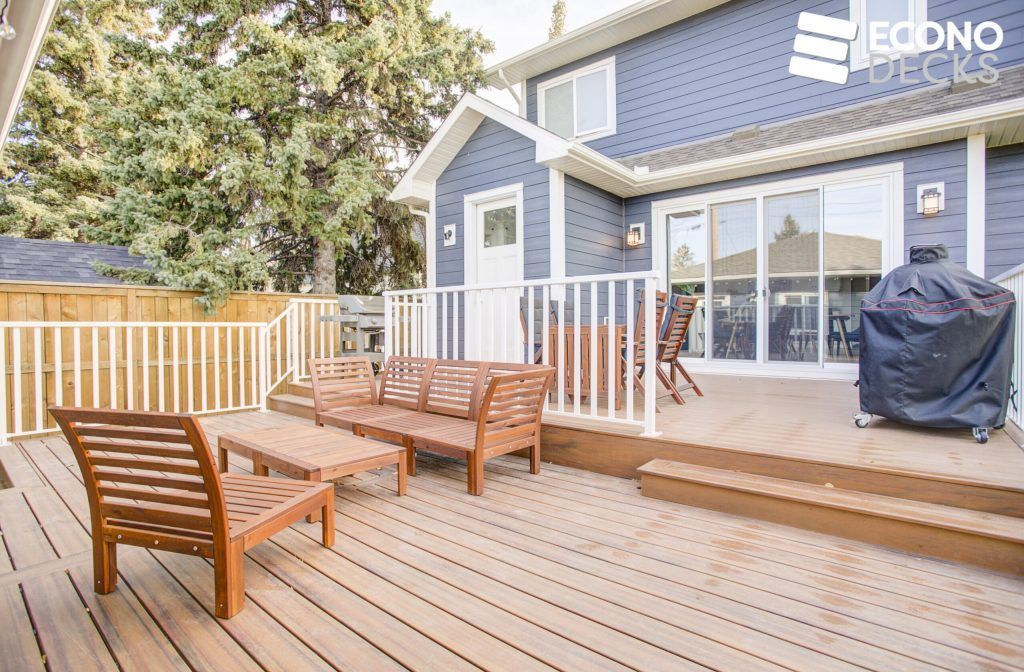When planning a new deck, one of the most important decisions is choosing the right material. Wood and composite decking are two of the most popular options, each with its own set of advantages and disadvantages. Your choice will depend on your personal preferences, budget, and long-term goals for your outdoor space. Let’s take an in-depth look at both materials to help you make an informed decision.
The Pros of Wood Decking
Wood decking remains a favorite among homeowners for several reasons:
- Classic Natural Aesthetic: The warmth and authenticity of natural wood are hard to replicate. Its rich colors and natural grain patterns give it a timeless appeal.
- Cost-Effective: Wood decking is generally less expensive upfront than composite options, making it an attractive choice for budget-conscious homeowners.
- Customizable: Different types of wood, such as cedar, redwood, and pressure-treated pine, offer a variety of options in terms of durability and aesthetics.
- Comfortable Feel: Wood stays cooler in direct sunlight compared to some composite options, offering a more comfortable surface for bare feet.
- DIY-Friendly: For those who enjoy DIY projects, wood decking is easier to work with when building or making repairs.
The Cons of Wood Decking
Despite its benefits, wood decking comes with challenges:
- High Maintenance Requirements: To prevent weathering, wood needs regular staining, sealing, or painting. Without proper care, it can splinter or crack.
- Vulnerability to Damage: Wood is susceptible to rot, mold, and insect infestations, potentially leading to costly repairs.
- Environmental Impact: The harvesting of trees for wood decking contributes to deforestation unless sustainably sourced.
- Shorter Lifespan: Over time, wood decking can warp or deteriorate, often requiring replacement sooner than composite alternatives.
The Pros of Composite Decking
Composite decking has gained significant popularity thanks to its modern design and low-maintenance benefits:
- Low Maintenance: Unlike wood, composite decking doesn’t require staining, sealing, or frequent repairs. Occasional cleaning with soap and water is sufficient.
- Durability: Composite decking is highly resistant to rot, mold, and insect damage, and it holds up well against harsh weather conditions.
- Eco-Friendly Options: Many composite boards are made from recycled materials, including wood fibers and plastics, making them an environmentally responsible choice.
- Long Lifespan: Composite decks can last 25 years or more, often outliving their wood counterparts.
- Consistent Appearance: The color and texture of composite decking remain consistent over time, without the need for refinishing.
The Cons of Composite Decking
Despite its advantages, composite decking isn’t perfect:
- Higher Initial Cost: Composite materials are generally more expensive upfront, although they often save money in the long run through reduced maintenance costs.
- Less Natural Look: Some homeowners feel that composite decking lacks the authenticity and charm of natural wood.
- Limited Color Options: While color choices are expanding, they may still be less diverse than natural wood options.
- Heat Retention: Composite decking can become hotter than wood in direct sunlight, which can be uncomfortable in warm climates.
- Susceptibility to Warping: Low-quality composite materials may warp or fade over time, so it’s crucial to choose a reputable brand.
A Closer Look at Costs
When comparing wood and composite decking, costs go beyond the initial purchase. While wood decking typically has a lower upfront price, the ongoing maintenance costs for staining, sealing, and repairs can add up over time. Composite decking’s higher initial cost is offset by its minimal maintenance needs and longevity, making it a cost-effective option for long-term homeowners.
Environmental Considerations
Both wood and composite decking have environmental impacts:
- Wood Decking: Responsible sourcing can mitigate the environmental effects of deforestation. Look for products certified by organizations like the Forest Stewardship Council (FSC).
- Composite Decking: While it uses recycled materials, the production of composite decking involves energy-intensive processes. However, its durability and low maintenance requirements can make it a more sustainable choice over its lifespan.
Maintenance Comparison
- Wood Decking: Requires frequent maintenance, including cleaning, staining, and sealing every 1–3 years.
- Composite Decking: Needs occasional cleaning to remove dirt and debris, with no additional treatments required.
Design and Customization
Both materials offer versatility in design:
- Wood Decking: Can be painted or stained in various colors and finishes. Its malleability allows for intricate designs and modifications.
- Composite Decking: Offers a clean, uniform appearance with built-in colors and textures, though customization options are more limited.
Which Material Is Right for You?
To determine the best material for your deck, consider these factors:
- Budget: Wood is more affordable initially, but composite may save money over time.
- Maintenance Tolerance: Composite decking is a clear winner if you prefer a low-maintenance deck.
- Aesthetics: If natural beauty is your priority, wood might be the better option.
- Longevity: Composite lasts longer, making it ideal for those seeking a durable, long-term solution.
Conclusion
Choosing between wood and composite decking ultimately depends on your needs and preferences. Both materials have their merits:
- Wood Decking: Perfect for those who love its classic aesthetic and are willing to invest time in maintenance.
- Composite Decking: Ideal for those who value durability, sustainability, and low upkeep.
By carefully weighing the pros and cons of each option, you can select the decking material that’s right for your home.





